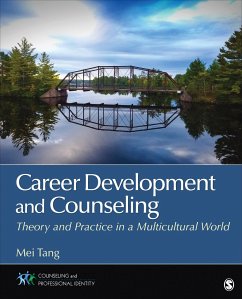- Broschiertes Buch
- Merkliste
- Auf die Merkliste
- Bewerten Bewerten
- Teilen
- Produkt teilen
- Produkterinnerung
- Produkterinnerung
"Career Development and Counseling will provide the reader with a solid foundation of career development theory along with strategies for direct work with diverse populations in a variety of settings." - Tara Malone, Fairfield University
Andere Kunden interessierten sich auch für
![Counseling Children and Adolescents in Schools Counseling Children and Adolescents in Schools]() Robyn S HessCounseling Children and Adolescents in Schools198,99 €
Robyn S HessCounseling Children and Adolescents in Schools198,99 €![Positive Psychology Positive Psychology]() Jennifer Teramoto PedrottiPositive Psychology198,99 €
Jennifer Teramoto PedrottiPositive Psychology198,99 €![Resilienz Resilienz]() Klaus Fröhlich-GildhoffResilienz17,00 €
Klaus Fröhlich-GildhoffResilienz17,00 €![Encyclopedia of Community Encyclopedia of Community]() Karen Christensen / David LevinsonEncyclopedia of Community1.269,99 €
Karen Christensen / David LevinsonEncyclopedia of Community1.269,99 €![Theories of Development Theories of Development]() William CrainTheories of Development182,99 €
William CrainTheories of Development182,99 €![A Year to Live A Year to Live]() Stephen LevineA Year to Live15,99 €
Stephen LevineA Year to Live15,99 €![Master of Lucid Dreams Master of Lucid Dreams]() Olga KharitidiMaster of Lucid Dreams20,99 €
Olga KharitidiMaster of Lucid Dreams20,99 €-
-
-
"Career Development and Counseling will provide the reader with a solid foundation of career development theory along with strategies for direct work with diverse populations in a variety of settings." - Tara Malone, Fairfield University
Hinweis: Dieser Artikel kann nur an eine deutsche Lieferadresse ausgeliefert werden.
Hinweis: Dieser Artikel kann nur an eine deutsche Lieferadresse ausgeliefert werden.
Produktdetails
- Produktdetails
- Verlag: Sage Publications
- Seitenzahl: 440
- Erscheinungstermin: 5. Oktober 2018
- Englisch
- Abmessung: 231mm x 188mm x 23mm
- Gewicht: 726g
- ISBN-13: 9781452230863
- ISBN-10: 1452230862
- Artikelnr.: 48384210
- Herstellerkennzeichnung
- Libri GmbH
- Europaallee 1
- 36244 Bad Hersfeld
- gpsr@libri.de
- Verlag: Sage Publications
- Seitenzahl: 440
- Erscheinungstermin: 5. Oktober 2018
- Englisch
- Abmessung: 231mm x 188mm x 23mm
- Gewicht: 726g
- ISBN-13: 9781452230863
- ISBN-10: 1452230862
- Artikelnr.: 48384210
- Herstellerkennzeichnung
- Libri GmbH
- Europaallee 1
- 36244 Bad Hersfeld
- gpsr@libri.de
Mei Tang has been a counselor educator for 15 years and has taught the Career Development class for over a decade. Her primary research focus is on career development, particularly multicultural career development. She has published extensively on career development topics and in the prestigious journals pertaining to career development, including Career Development Quarterly, Journal of Vocational Behavior, and Journal of Career Assessment. She is also a member of the NCDA/ACES Commission, providing leadership for improving the quality of career development courses in counselor education programs.
Series Editors' Preface
Preface
Acknowledgements
About the Author
Chapter 1. Roots, Growth and Trends of Career Development and Intervention
Learning Objectives
Overview of Historical Development
Professionalism
Current Status and Future Trends of Career Development
Summary: Challenges and Opportunities
Keystones
Additional Resources
References
Chapter 2. Work in Global Context
Learning Objectives
Meaning of Work
Work and Global Changing Economy
Work and Health
Personal and Contextual Factors for Career Development
Integrated View of Career Development
The Ecological Perspective of Career Intervention
Summary: Challenges and Opportunities
Keystones
Additional Resources
References
Chapter 3. Cross-Cultural Perspectives in Career Development
Learning Objectives
Changing Workforce
Social Barriers to Career Development
Multicultural Career Development Issues
Intersection of Diversity
Multicultural Competency in Career Counseling
Summary: Challenges and Opportunities
Keystones
Additional Resources
References
Chapter 4. Career Development Theories I
Learning Objectives
Earlier Approaches
Trait-and-Factor Approaches
Developmental Approaches
Social Cognitive Approaches
Summary: Challenges and Opportunities
Keystones
Additional Resources
References
Chapter 5. Career Development Theories II
Learning Objectives
Theories With Focus on Process
Theories Focusing on Needs and Values
Theories From a Holistic View
Theories of Construction Perspective
Summary: Challenges and Opportunities
Keystones
Additional Resources
References
Chapter 6. Career Counseling Process
Learning Objectives
Overview of Career Counseling
Role of Counselors
Client Factors
Process of Career Counseling
Follow Up
Decision-Making Process and Skills
Summary: Challenges and Opportunities
Keystones
Additional Resources
References
Chapter 7. Assessment
Learning Objectives
Role of Assessment in Career Development Intervention
Purpose of Assessment
Areas and Contents of Assessment
Appropriate Use of Assessment
Procedure of Assessment
Selecting Assessment Tools
Variety of Methods for Assessment
Cultural, Ethical, and Legal Concerns of Use of Assessment
Summary: Challenges and Opportunities
Keystones
Additional Resources
References
Chapter 8. Career Counseling Strategies and Techniques
Learning Objectives
Purpose of Career Counseling Techniques
Strategies Facilitating Career Exploration
Strategies for Career Decision Making
Strategies for Action
Building Career Resilience
Summary: Challenges and Opportunities
Keystones
Additional Resources
References
Chapter 9. Information, Technology, and Career Information Resources (by
Julia Larson)
Learning Objectives
Role of Technology in Career Development
Counselor-Focused Technology
Client-Focused Technology and Resources
Multicultural Competency and Technology Use Enhances Career Counseling
Impact of Technology on Individuals' Career Development
Summary: Challenges and Opportunities
Keystones
Additional Resources
References
Chapter 10. Designing and Evaluating Career Development Intervention
Programs
Learning Objectives
Rationale of Career Development Programs
Principles of Career Development Intervention Programs
Process of Career Development Intervention Programs
Career Development Programs With Diverse Population and Various Settings
Summary: Ecological Validity
Keystones
References
Appendix A: ASCA National Standards for Students
Chapter 11. Career Development Prevention and Intervention in K-12 School
Settings (by Mary L. Anderson)
Learning Objectives
Goals and Scope of Career Development Programs in K-12: The American School
Counselor Association (ASCA) National Model
Educational Reform and Initiatives
Theoretical Applications: Working With Children and Adolescents
Career Development Programs K-12
Career Services in Elementary Schoo
Career Services in Middle Schools
Career Services in High Schools
Multicultural and Ethical Considerations
Summary: Challenges and Opportunities
Keystones
Additional Resources
References
Chapter 12. Career Development Intervention in Postsecondary Education
Institutions (by Kimberly Gilliam and Mei Tang)
Learning Objectives
Characteristics of College Students
Goals and Scope of Career Services for College Students
Career Services Models for College Students
Essentials of Career Development Programs in College Settings
Building Multicultural Responsive Services
Summary: Challenges and Opportunities
Keystones
Additional Resources
References
Appendix A: Sample of Academic Course (3 credits for undergraduate
students)
Chapter 13. Career Counseling in Community Settings (by Rhonda Norman and
Norman Townsel)
Learning Objectives
Goals and Scope of Career Development Programs in the Community
Community Settings
Multicultural Approaches to Career Development in the Community
Summary: Challenges and Opportunities
Keystones
Additional Resources
References
Chapter 14. Adult Career Development (by Jane Goodman)
Learning Objectives
Typical Adult Development Needs
Job Loss
Adaptability
Multicultural Issues
Modern Theories of Career Development Applied to Adults
Retirement
Summary: Challenges and Opportunities
Keystones
References
Chapter 15. Integration of Theory and Practice
Learning Objectives
Person and Context Interaction
Integration of Theory and Practice
Ethical Practice for Prevention and Intervention
Promoting Wellness Through Work and Health
Integrated Services
Summary: Challenges and Opportunities
Keystones
References
Index
Preface
Acknowledgements
About the Author
Chapter 1. Roots, Growth and Trends of Career Development and Intervention
Learning Objectives
Overview of Historical Development
Professionalism
Current Status and Future Trends of Career Development
Summary: Challenges and Opportunities
Keystones
Additional Resources
References
Chapter 2. Work in Global Context
Learning Objectives
Meaning of Work
Work and Global Changing Economy
Work and Health
Personal and Contextual Factors for Career Development
Integrated View of Career Development
The Ecological Perspective of Career Intervention
Summary: Challenges and Opportunities
Keystones
Additional Resources
References
Chapter 3. Cross-Cultural Perspectives in Career Development
Learning Objectives
Changing Workforce
Social Barriers to Career Development
Multicultural Career Development Issues
Intersection of Diversity
Multicultural Competency in Career Counseling
Summary: Challenges and Opportunities
Keystones
Additional Resources
References
Chapter 4. Career Development Theories I
Learning Objectives
Earlier Approaches
Trait-and-Factor Approaches
Developmental Approaches
Social Cognitive Approaches
Summary: Challenges and Opportunities
Keystones
Additional Resources
References
Chapter 5. Career Development Theories II
Learning Objectives
Theories With Focus on Process
Theories Focusing on Needs and Values
Theories From a Holistic View
Theories of Construction Perspective
Summary: Challenges and Opportunities
Keystones
Additional Resources
References
Chapter 6. Career Counseling Process
Learning Objectives
Overview of Career Counseling
Role of Counselors
Client Factors
Process of Career Counseling
Follow Up
Decision-Making Process and Skills
Summary: Challenges and Opportunities
Keystones
Additional Resources
References
Chapter 7. Assessment
Learning Objectives
Role of Assessment in Career Development Intervention
Purpose of Assessment
Areas and Contents of Assessment
Appropriate Use of Assessment
Procedure of Assessment
Selecting Assessment Tools
Variety of Methods for Assessment
Cultural, Ethical, and Legal Concerns of Use of Assessment
Summary: Challenges and Opportunities
Keystones
Additional Resources
References
Chapter 8. Career Counseling Strategies and Techniques
Learning Objectives
Purpose of Career Counseling Techniques
Strategies Facilitating Career Exploration
Strategies for Career Decision Making
Strategies for Action
Building Career Resilience
Summary: Challenges and Opportunities
Keystones
Additional Resources
References
Chapter 9. Information, Technology, and Career Information Resources (by
Julia Larson)
Learning Objectives
Role of Technology in Career Development
Counselor-Focused Technology
Client-Focused Technology and Resources
Multicultural Competency and Technology Use Enhances Career Counseling
Impact of Technology on Individuals' Career Development
Summary: Challenges and Opportunities
Keystones
Additional Resources
References
Chapter 10. Designing and Evaluating Career Development Intervention
Programs
Learning Objectives
Rationale of Career Development Programs
Principles of Career Development Intervention Programs
Process of Career Development Intervention Programs
Career Development Programs With Diverse Population and Various Settings
Summary: Ecological Validity
Keystones
References
Appendix A: ASCA National Standards for Students
Chapter 11. Career Development Prevention and Intervention in K-12 School
Settings (by Mary L. Anderson)
Learning Objectives
Goals and Scope of Career Development Programs in K-12: The American School
Counselor Association (ASCA) National Model
Educational Reform and Initiatives
Theoretical Applications: Working With Children and Adolescents
Career Development Programs K-12
Career Services in Elementary Schoo
Career Services in Middle Schools
Career Services in High Schools
Multicultural and Ethical Considerations
Summary: Challenges and Opportunities
Keystones
Additional Resources
References
Chapter 12. Career Development Intervention in Postsecondary Education
Institutions (by Kimberly Gilliam and Mei Tang)
Learning Objectives
Characteristics of College Students
Goals and Scope of Career Services for College Students
Career Services Models for College Students
Essentials of Career Development Programs in College Settings
Building Multicultural Responsive Services
Summary: Challenges and Opportunities
Keystones
Additional Resources
References
Appendix A: Sample of Academic Course (3 credits for undergraduate
students)
Chapter 13. Career Counseling in Community Settings (by Rhonda Norman and
Norman Townsel)
Learning Objectives
Goals and Scope of Career Development Programs in the Community
Community Settings
Multicultural Approaches to Career Development in the Community
Summary: Challenges and Opportunities
Keystones
Additional Resources
References
Chapter 14. Adult Career Development (by Jane Goodman)
Learning Objectives
Typical Adult Development Needs
Job Loss
Adaptability
Multicultural Issues
Modern Theories of Career Development Applied to Adults
Retirement
Summary: Challenges and Opportunities
Keystones
References
Chapter 15. Integration of Theory and Practice
Learning Objectives
Person and Context Interaction
Integration of Theory and Practice
Ethical Practice for Prevention and Intervention
Promoting Wellness Through Work and Health
Integrated Services
Summary: Challenges and Opportunities
Keystones
References
Index
Series Editors' Preface
Preface
Acknowledgements
About the Author
Chapter 1. Roots, Growth and Trends of Career Development and Intervention
Learning Objectives
Overview of Historical Development
Professionalism
Current Status and Future Trends of Career Development
Summary: Challenges and Opportunities
Keystones
Additional Resources
References
Chapter 2. Work in Global Context
Learning Objectives
Meaning of Work
Work and Global Changing Economy
Work and Health
Personal and Contextual Factors for Career Development
Integrated View of Career Development
The Ecological Perspective of Career Intervention
Summary: Challenges and Opportunities
Keystones
Additional Resources
References
Chapter 3. Cross-Cultural Perspectives in Career Development
Learning Objectives
Changing Workforce
Social Barriers to Career Development
Multicultural Career Development Issues
Intersection of Diversity
Multicultural Competency in Career Counseling
Summary: Challenges and Opportunities
Keystones
Additional Resources
References
Chapter 4. Career Development Theories I
Learning Objectives
Earlier Approaches
Trait-and-Factor Approaches
Developmental Approaches
Social Cognitive Approaches
Summary: Challenges and Opportunities
Keystones
Additional Resources
References
Chapter 5. Career Development Theories II
Learning Objectives
Theories With Focus on Process
Theories Focusing on Needs and Values
Theories From a Holistic View
Theories of Construction Perspective
Summary: Challenges and Opportunities
Keystones
Additional Resources
References
Chapter 6. Career Counseling Process
Learning Objectives
Overview of Career Counseling
Role of Counselors
Client Factors
Process of Career Counseling
Follow Up
Decision-Making Process and Skills
Summary: Challenges and Opportunities
Keystones
Additional Resources
References
Chapter 7. Assessment
Learning Objectives
Role of Assessment in Career Development Intervention
Purpose of Assessment
Areas and Contents of Assessment
Appropriate Use of Assessment
Procedure of Assessment
Selecting Assessment Tools
Variety of Methods for Assessment
Cultural, Ethical, and Legal Concerns of Use of Assessment
Summary: Challenges and Opportunities
Keystones
Additional Resources
References
Chapter 8. Career Counseling Strategies and Techniques
Learning Objectives
Purpose of Career Counseling Techniques
Strategies Facilitating Career Exploration
Strategies for Career Decision Making
Strategies for Action
Building Career Resilience
Summary: Challenges and Opportunities
Keystones
Additional Resources
References
Chapter 9. Information, Technology, and Career Information Resources (by
Julia Larson)
Learning Objectives
Role of Technology in Career Development
Counselor-Focused Technology
Client-Focused Technology and Resources
Multicultural Competency and Technology Use Enhances Career Counseling
Impact of Technology on Individuals' Career Development
Summary: Challenges and Opportunities
Keystones
Additional Resources
References
Chapter 10. Designing and Evaluating Career Development Intervention
Programs
Learning Objectives
Rationale of Career Development Programs
Principles of Career Development Intervention Programs
Process of Career Development Intervention Programs
Career Development Programs With Diverse Population and Various Settings
Summary: Ecological Validity
Keystones
References
Appendix A: ASCA National Standards for Students
Chapter 11. Career Development Prevention and Intervention in K-12 School
Settings (by Mary L. Anderson)
Learning Objectives
Goals and Scope of Career Development Programs in K-12: The American School
Counselor Association (ASCA) National Model
Educational Reform and Initiatives
Theoretical Applications: Working With Children and Adolescents
Career Development Programs K-12
Career Services in Elementary Schoo
Career Services in Middle Schools
Career Services in High Schools
Multicultural and Ethical Considerations
Summary: Challenges and Opportunities
Keystones
Additional Resources
References
Chapter 12. Career Development Intervention in Postsecondary Education
Institutions (by Kimberly Gilliam and Mei Tang)
Learning Objectives
Characteristics of College Students
Goals and Scope of Career Services for College Students
Career Services Models for College Students
Essentials of Career Development Programs in College Settings
Building Multicultural Responsive Services
Summary: Challenges and Opportunities
Keystones
Additional Resources
References
Appendix A: Sample of Academic Course (3 credits for undergraduate
students)
Chapter 13. Career Counseling in Community Settings (by Rhonda Norman and
Norman Townsel)
Learning Objectives
Goals and Scope of Career Development Programs in the Community
Community Settings
Multicultural Approaches to Career Development in the Community
Summary: Challenges and Opportunities
Keystones
Additional Resources
References
Chapter 14. Adult Career Development (by Jane Goodman)
Learning Objectives
Typical Adult Development Needs
Job Loss
Adaptability
Multicultural Issues
Modern Theories of Career Development Applied to Adults
Retirement
Summary: Challenges and Opportunities
Keystones
References
Chapter 15. Integration of Theory and Practice
Learning Objectives
Person and Context Interaction
Integration of Theory and Practice
Ethical Practice for Prevention and Intervention
Promoting Wellness Through Work and Health
Integrated Services
Summary: Challenges and Opportunities
Keystones
References
Index
Preface
Acknowledgements
About the Author
Chapter 1. Roots, Growth and Trends of Career Development and Intervention
Learning Objectives
Overview of Historical Development
Professionalism
Current Status and Future Trends of Career Development
Summary: Challenges and Opportunities
Keystones
Additional Resources
References
Chapter 2. Work in Global Context
Learning Objectives
Meaning of Work
Work and Global Changing Economy
Work and Health
Personal and Contextual Factors for Career Development
Integrated View of Career Development
The Ecological Perspective of Career Intervention
Summary: Challenges and Opportunities
Keystones
Additional Resources
References
Chapter 3. Cross-Cultural Perspectives in Career Development
Learning Objectives
Changing Workforce
Social Barriers to Career Development
Multicultural Career Development Issues
Intersection of Diversity
Multicultural Competency in Career Counseling
Summary: Challenges and Opportunities
Keystones
Additional Resources
References
Chapter 4. Career Development Theories I
Learning Objectives
Earlier Approaches
Trait-and-Factor Approaches
Developmental Approaches
Social Cognitive Approaches
Summary: Challenges and Opportunities
Keystones
Additional Resources
References
Chapter 5. Career Development Theories II
Learning Objectives
Theories With Focus on Process
Theories Focusing on Needs and Values
Theories From a Holistic View
Theories of Construction Perspective
Summary: Challenges and Opportunities
Keystones
Additional Resources
References
Chapter 6. Career Counseling Process
Learning Objectives
Overview of Career Counseling
Role of Counselors
Client Factors
Process of Career Counseling
Follow Up
Decision-Making Process and Skills
Summary: Challenges and Opportunities
Keystones
Additional Resources
References
Chapter 7. Assessment
Learning Objectives
Role of Assessment in Career Development Intervention
Purpose of Assessment
Areas and Contents of Assessment
Appropriate Use of Assessment
Procedure of Assessment
Selecting Assessment Tools
Variety of Methods for Assessment
Cultural, Ethical, and Legal Concerns of Use of Assessment
Summary: Challenges and Opportunities
Keystones
Additional Resources
References
Chapter 8. Career Counseling Strategies and Techniques
Learning Objectives
Purpose of Career Counseling Techniques
Strategies Facilitating Career Exploration
Strategies for Career Decision Making
Strategies for Action
Building Career Resilience
Summary: Challenges and Opportunities
Keystones
Additional Resources
References
Chapter 9. Information, Technology, and Career Information Resources (by
Julia Larson)
Learning Objectives
Role of Technology in Career Development
Counselor-Focused Technology
Client-Focused Technology and Resources
Multicultural Competency and Technology Use Enhances Career Counseling
Impact of Technology on Individuals' Career Development
Summary: Challenges and Opportunities
Keystones
Additional Resources
References
Chapter 10. Designing and Evaluating Career Development Intervention
Programs
Learning Objectives
Rationale of Career Development Programs
Principles of Career Development Intervention Programs
Process of Career Development Intervention Programs
Career Development Programs With Diverse Population and Various Settings
Summary: Ecological Validity
Keystones
References
Appendix A: ASCA National Standards for Students
Chapter 11. Career Development Prevention and Intervention in K-12 School
Settings (by Mary L. Anderson)
Learning Objectives
Goals and Scope of Career Development Programs in K-12: The American School
Counselor Association (ASCA) National Model
Educational Reform and Initiatives
Theoretical Applications: Working With Children and Adolescents
Career Development Programs K-12
Career Services in Elementary Schoo
Career Services in Middle Schools
Career Services in High Schools
Multicultural and Ethical Considerations
Summary: Challenges and Opportunities
Keystones
Additional Resources
References
Chapter 12. Career Development Intervention in Postsecondary Education
Institutions (by Kimberly Gilliam and Mei Tang)
Learning Objectives
Characteristics of College Students
Goals and Scope of Career Services for College Students
Career Services Models for College Students
Essentials of Career Development Programs in College Settings
Building Multicultural Responsive Services
Summary: Challenges and Opportunities
Keystones
Additional Resources
References
Appendix A: Sample of Academic Course (3 credits for undergraduate
students)
Chapter 13. Career Counseling in Community Settings (by Rhonda Norman and
Norman Townsel)
Learning Objectives
Goals and Scope of Career Development Programs in the Community
Community Settings
Multicultural Approaches to Career Development in the Community
Summary: Challenges and Opportunities
Keystones
Additional Resources
References
Chapter 14. Adult Career Development (by Jane Goodman)
Learning Objectives
Typical Adult Development Needs
Job Loss
Adaptability
Multicultural Issues
Modern Theories of Career Development Applied to Adults
Retirement
Summary: Challenges and Opportunities
Keystones
References
Chapter 15. Integration of Theory and Practice
Learning Objectives
Person and Context Interaction
Integration of Theory and Practice
Ethical Practice for Prevention and Intervention
Promoting Wellness Through Work and Health
Integrated Services
Summary: Challenges and Opportunities
Keystones
References
Index








